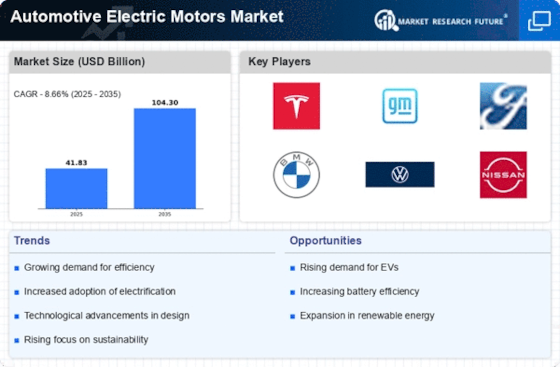Top Industry Leaders in the Automotive Electric Motors Market
The automotive industry is in the throes of a monumental transformation, driven by the burgeoning demand for eco-friendly mobility solutions. Central to this revolution is the electric motor, an essential force propelling vehicles toward a sustainable future. This ascent has ignited a fierce competition among established industry leaders and ambitious newcomers, all seeking supremacy in this dynamic terrain.
Key Players and Their Strategies: In this competitive field, significant players include Robert Bosch GmbH (Germany), Chengdu Huachuan Electric Parts Co.,Ltd. (China), Chongqing Bright Industry Group Co., Ltd. (China), Hubei Shendian Auto Motor Co., Ltd. (China), Jinzhou Halla Electrical Equipment Co., Ltd. (China), Johnson Electric International AG (Hong Kong), Mitsubishi Electric Corporation (Japan), Shanghai Valeo Automotive Electrical Systems Co., Ltd. (China), Shanghai Valeo Automotive Motor & Wiper Systems Co., Ltd. (China), Taizhou ValeoWenling Automotive Systems Co., Ltd. (China), among others.
Tier 1 Suppliers: Leading giants like Bosch, Denso, Continental, and Magna International leverage their vast technological prowess and global presence to cater to major automakers. Bosch, for instance, concentrates on high-performance AC synchronous motors, while Denso emphasizes cost-efficiency through its permanent magnet synchronous motors.
EV-Centric Startups: Nimble players such as Tesla, Lucid Motors, and Rivian Motors disrupt the market with innovative motor designs and in-house production capabilities. Tesla's focus on efficiency and integration with battery packs has resulted in industry-leading range figures, while Lucid Motors boasts high-performance motors with exceptional power density.
Traditional Automakers: Major car manufacturers like Volkswagen Group, Toyota, and General Motors are heavily investing in developing their electric motor technology. Volkswagen's MEB platform showcases highly adaptable motors for various vehicle segments, while Toyota explores alternative motor designs like in-wheel motors for improved packaging and weight reduction.
Factors for Market Share Analysis: Several factors influence market share analysis within this competitive arena. Companies leading in technology, offering superior efficiency, power density, and durability, gain a significant competitive edge. Additionally, cost competitiveness through mass production capabilities and strategic sourcing of raw materials becomes crucial, particularly for budget-oriented segments. Companies with control over the entire supply chain, from material extraction to motor assembly, wield a cost advantage and have greater quality control. Furthermore, understanding and adapting to regional regulations, EV adoption rates, and consumer preferences are imperative for market dominance in specific geographies.
New and Emerging Trends: In response to concerns about rare-earth elements, the industry is steering toward rare earth-free motors utilizing readily available materials like copper and steel. Silicon carbide (SiC) semiconductors are gaining prominence for offering superior heat resistance and faster switching speeds, enabling more efficient and compact inverter systems. Additionally, advancements in wireless charging integration directly through the motor could eliminate the need for charging cables, significantly enhancing convenience. The emergence of software-defined motors allows tailoring of motor performance through software updates, optimizing efficiency and driving experience based on diverse scenarios and preferences.
Overall Competitive Scenario: The automotive electric motors market is marked by intense competition among established players, nimble startups, and proactive automakers. Key differentiators in this high-growth market include technological innovation, cost efficiency, and adaptability to regional demands. Collaborations along the value chain and strategic mergers and acquisitions are expected to reshape the competitive landscape. With government regulations and consumer demand for EVs on the rise, the race for dominance in the electric motor space is only just beginning.
Industry Developments and Latest Updates:
- Bosch announced a collaboration with Rimac Technology focusing on high-efficiency and compact electric motor development.
- Shanghai Valeo Automotive Motor & Wiper Systems received ISO 9001:2015 certification, underlining its commitment to quality control.
- Taizhou ValeoWenling Automotive Systems completed the first phase of its electric motor production line expansion, boosting capacity by 50%.

